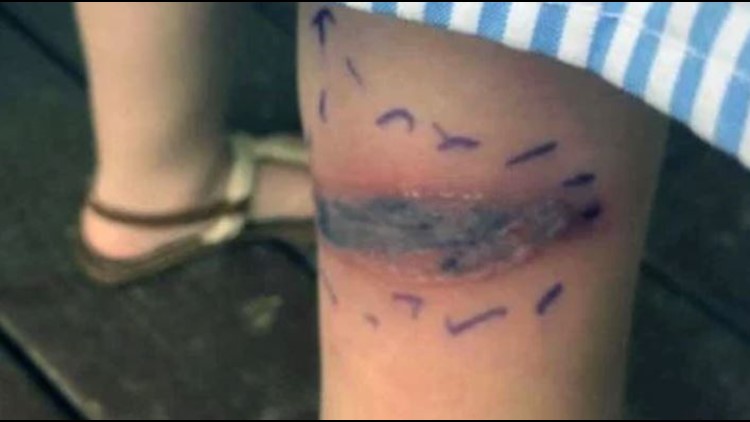At first, Kristine Donovan thought the dark mark on the back of her 5-year-old daughter's leg looked like a bruise.
It wouldn't have been unusual, given that her energetic daughter, Kailyn, frequently plays outside their Mendon, Massachusetts, home for hours.
But when the "bruise" started turning black a few days later, Donovan knew something wasn't right.
On Friday, the concerned mom rushed her daughter to a nearby hospital, where she was told the wound was caused by a black widow spider bite.
The bite of a female black widow can be very painful. The venom is thought to be 15 times more potent than that of a rattlesnake and can cause severe muscle pain and spasms, as well as abdominal cramps, for up to a week.
"She never felt it bite her," a surprised Donovan told CBS Boston. "It could have been in her jeans in the location where it bit her, we just don't know."
Kailyn is now being treated with antibiotics and frequent dressing changes.
Dr. William Durbin, the pediatric infectious diseases specialist who has been treating Kailyn at UMass Memorial Medical Center since Saturday, told The Boston Globe the dark purple and black colors on the wound was a byproduct of necrosis, or cell death.
"She had a very distinctive bite, which was very scary for her parents and of course the doctors, too," Durbin said.
More than 2,000 people in the U.S. report black widow spider bites yearly, but deaths are rare these days. According to the National Institutes of Health, fatalities from black widow bites typically occur among young children, the elderly and those who are extremely ill.
Luckily, Donovan says the bite was treated in time and already appears to be healing.
"She's happier now that we're not in the hospital," Donovan said. "It doesn't seem to bother her. She looks at it, she doesn't think it's gross, so I try not to make a big deal out of it, to make her nervous or anything."
Though black widows are mostly found in the southern and western regions of the United States, Donovan says her daughter's story should serve as a warning -- there's a possibility of a black widow spider bite no matter where you live.
As a precaution, Donovan plans to spray around her house, hoping to kill any venomous spiders that may remain.
"We're going to be spraying, and they're going to come in the house and do some spraying in here too," Donovan told CBS Boston. "But the doctor said it definitely was outside -- they don't chase people. It probably was bothered. We've been doing a lot of yard work, it probably upset one of them and she was just in the wrong place at the wrong time."



